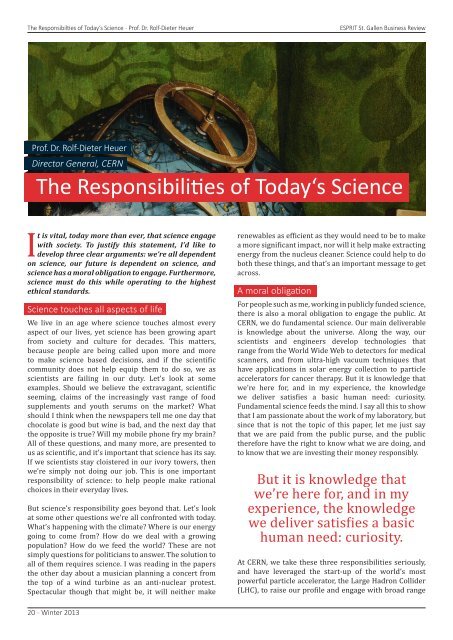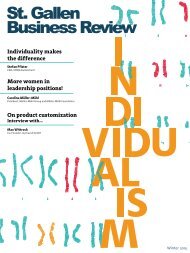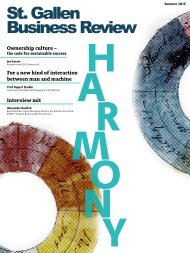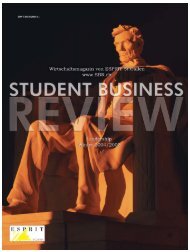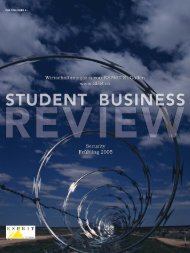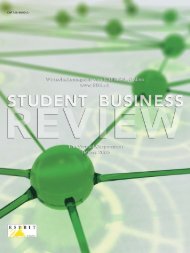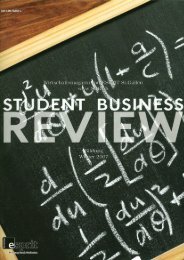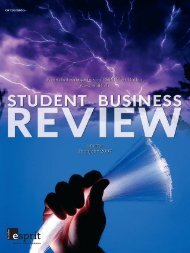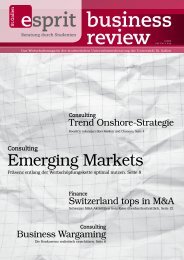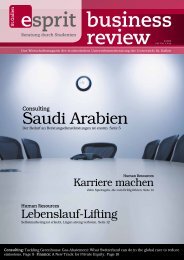Role Models & Responsibility
St. Gallen Business Review Winter 2013
St. Gallen Business Review
Winter 2013
You also want an ePaper? Increase the reach of your titles
YUMPU automatically turns print PDFs into web optimized ePapers that Google loves.
- Prof. Dr. Rolf-Dieter Heuer<br />
ESPRIT St. Gallen Business Review<br />
Prof. Dr. Rolf-Dieter Heuer<br />
<br />
<br />
It is vital, today more than ever, that science engage<br />
with society. To justify this statement, I’d like to<br />
develop three clear arguments: we’re all dependent<br />
on science, our future is dependent on science, and<br />
science has a moral obligation to engage. Furthermore,<br />
science must do this while operating to the highest<br />
ethical standards.<br />
Science touches all aspects of life<br />
We live in an age where science touches almost every<br />
aspect of our lives, yet science has been growing apart<br />
from society and culture for decades. This matters,<br />
because people are being called upon more and more<br />
<br />
community does not help equip them to do so, we as<br />
scientists are failing in our duty. Let’s look at some<br />
<br />
seeming, claims of the increasingly vast range of food<br />
supplements and youth serums on the market? What<br />
should I think when the newspapers tell me one day that<br />
chocolate is good but wine is bad, and the next day that<br />
the opposite is true? Will my mobile phone fry my brain?<br />
All of these questions, and many more, are presented to<br />
<br />
If we scientists stay cloistered in our ivory towers, then<br />
we’re simply not doing our job. This is one important<br />
responsibility of science: to help people make rational<br />
choices in their everyday lives.<br />
But science’s responsibility goes beyond that. Let’s look<br />
at some other questions we’re all confronted with today.<br />
What’s happening with the climate? Where is our energy<br />
going to come from? How do we deal with a growing<br />
population? How do we feed the world? These are not<br />
simply questions for politicians to answer. The solution to<br />
all of them requires science. I was reading in the papers<br />
the other day about a musician planning a concert from<br />
the top of a wind turbine as an anti-nuclear protest.<br />
Spectacular though that might be, it will neither make<br />
<br />
<br />
energy from the nucleus cleaner. Science could help to do<br />
both these things, and that’s an important message to get<br />
across.<br />
<br />
ce,<br />
there is also a moral obligation to engage the public. At<br />
CERN, we do fundamental science. Our main deliverable<br />
is knowledge about the universe. Along the way, our<br />
scientists and engineers develop technologies that<br />
range from the World Wide Web to detectors for medical<br />
scanners, and from ultra-high vacuum techniques that<br />
have applications in solar energy collection to particle<br />
accelerators for cancer therapy. But it is knowledge that<br />
we’re here for, and in my experience, the knowledge<br />
<br />
<br />
that I am passionate about the work of my laboratory, but<br />
since that is not the topic of this paper, let me just say<br />
that we are paid from the public purse, and the public<br />
therefore have the right to know what we are doing, and<br />
to know that we are investing their money responsibly.<br />
But it is knowledge that<br />
we’re here for, and in my<br />
experience, the knowledge<br />
<br />
human need: curiosity.<br />
At CERN, we take these three responsibilities seriously,<br />
and have leveraged the start-up of the world’s most<br />
powerful particle accelerator, the Large Hadron Collider<br />
<br />
20 - Winter 2013


